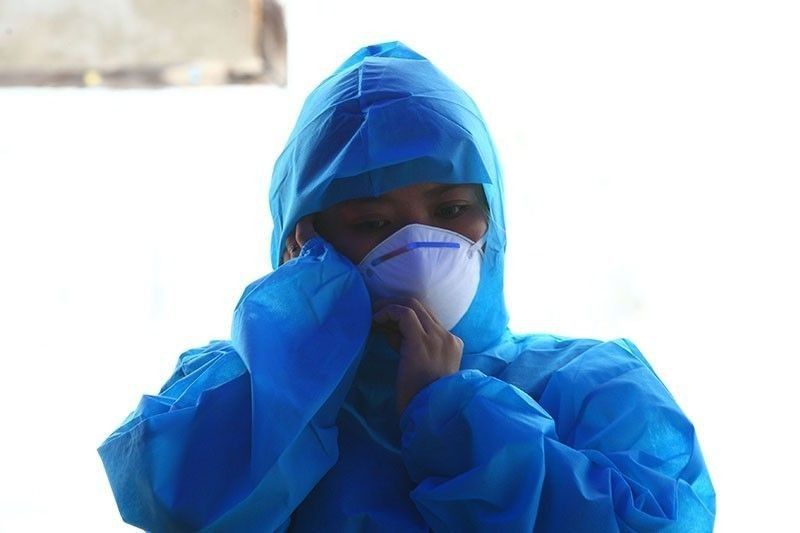HCWs protest low budget of public hospitals

MANILA, Philippines — Several health care workers from different public hospitals held a protest yesterday at the Senate building in Pasay City, urging lawmakers to increase the public hospital budget for 2023.
Members of the Alliance for Health Workers (AHW) also asked the Senate to fund the COVID-19 benefits of medical frontliners for next year.
They lamented that until now, the health workers’ COVID-19 allowances such as the Health Emergency Allowance for July-December 2021 and July-November 2022 have not yet been released.
“Worst, One COVID Allowances of private and local government unit health workers covering the period of January-June 2022 are not yet fully implemented,” Robert Mendoza, AHW national president, said.
The group reiterated that in order for health workers to stay and work in the country, the government must address their long-standing demands such as raising salaries, providing and releasing promptly their benefits, and mass hiring for regular positions.
“The government continuously exploits us by hiring health workers with no permanent positions. It does not recognize health workers as vital and essential workforce in the health care delivery system,” said Mendoza.
He noted that “there are 21,038 vacant positions in the DOH, but ironically they continuously hire contractual health workers.”
“We stand firm that the vacant positions must be filled; hire more health workers, and those contractual in our ranks must be regularized. This is to solve the perennial problem of understaffing and the long queue of patients who are deprived of quality health care,” stressed Mendoza.
“Instead of increasing the budget of all public hospitals, the Marcos administration is pushing further the privatization of public hospitals by cutting the Maintenance and Other Operating Expense (MOOE) budget of the Philippine General Hospital (PGH) and specialty hospitals like the Lung Center of the Philippines, Philippine Heart Center, Philippine Children’s Medical Center and National Kidney and Transplant Institute,” the AHW said.
In order to effectively serve our patients, the MOOE budget should not be reduced but rather increased especially now that patients in these particular hospitals are increasing, it added.
“The four specialty hospitals budget for MOOE are cut by a total of P881 million or 15.43 percent from the 2022 General Appropriations Act, thereby depriving more indigent patients to avail of the services of these specialty hospitals. Even PGH where patients queue for hospital services has a budget cut of P19.444 million from the P3.155 billion 2022 MOOE and zero capital outlay for 2023,” said Mendoza.
The health workers said that budget allocation for drugs and medicines, laboratory, x-ray, diagnostic equipment and medical supplies must be increased and allocated directly to public hospitals so that it can be directly utilized by indigent patients.
“In recent years up to now, the capital outlay budget of public hospitals which is intended to repair hospital facilities and purchase of equipment has zero allocation, resulting in inefficient and poor quality diagnostic procedures,” Mendoza said.
“While some government officials and other government agencies are vying for huge budget, there are long lines of poor patients in public hospitals who badly need free and quality health care services. Thus, we demand from the senators to realign the intelligence fund and confidential funds of other government agencies and allocate them directly to public health services for the patients’ welfare,” he added.
‘Budget cuts to cripple some railway projects’
Still on the budget, Sen. Joseph Victor Ejercito revealed that impending budget cuts in the commuter railway system could cripple some railway projects.
During his interpellation on the proposed budget of the Department of Transportation (DOTr), Ejercito raised these concerns that would particularly affect such ongoing projects as the North-South Commuter Railway System and the first phase of the Metro Manila Subway System.
“Both the national government and the country’s economic recovery will suffer from these budget cuts on the railway sector,” said Ejercito, appealing to his colleagues to restore the budget cut from the projects.
Sen. Grace Poe, who sponsored the proposed 2023 budget of the DOTr, admitted that the budget cuts that Ejercito pointed out could potentially delay the country’s railway projects by about a year.
“We keep doing this for all of our projects. This is not new. We need to be able to see what the priorities are and hopefully, this is one of them,” Poe said.
Ejercito revealed that in the House of Representatives version of the budget, the commuter railway system suffered a budget cut of around P40 billion, while about P10 billion was slashed from the proposed budget for the subway system.
The Senate’s version, on the other hand, stated that around P69 billion was removed from the budget’s unprogrammed appropriations, which will be used to pay for the live contracts of the projects’ contractors. – Cecille Suerte Felipe
- Latest
- Trending































